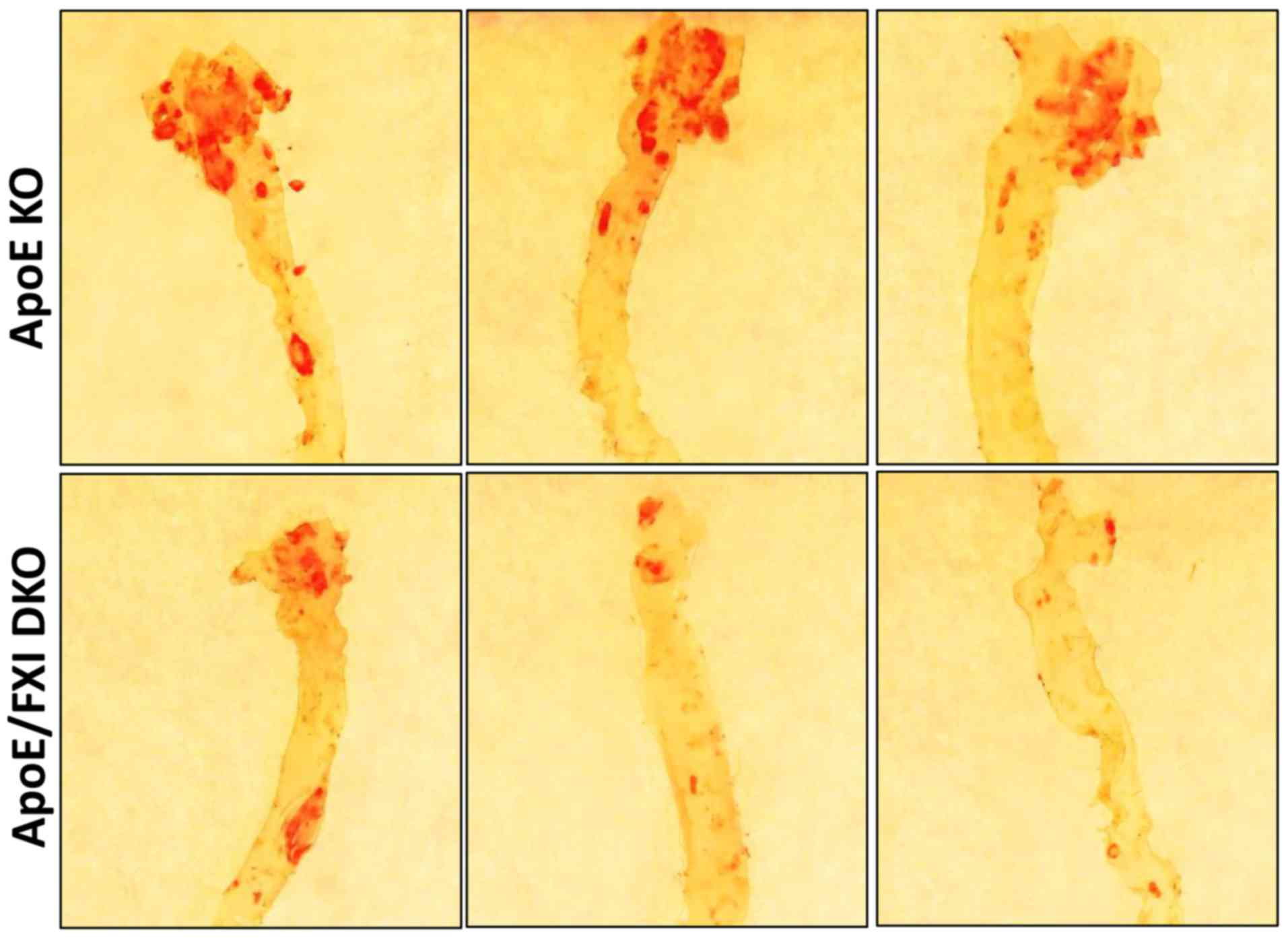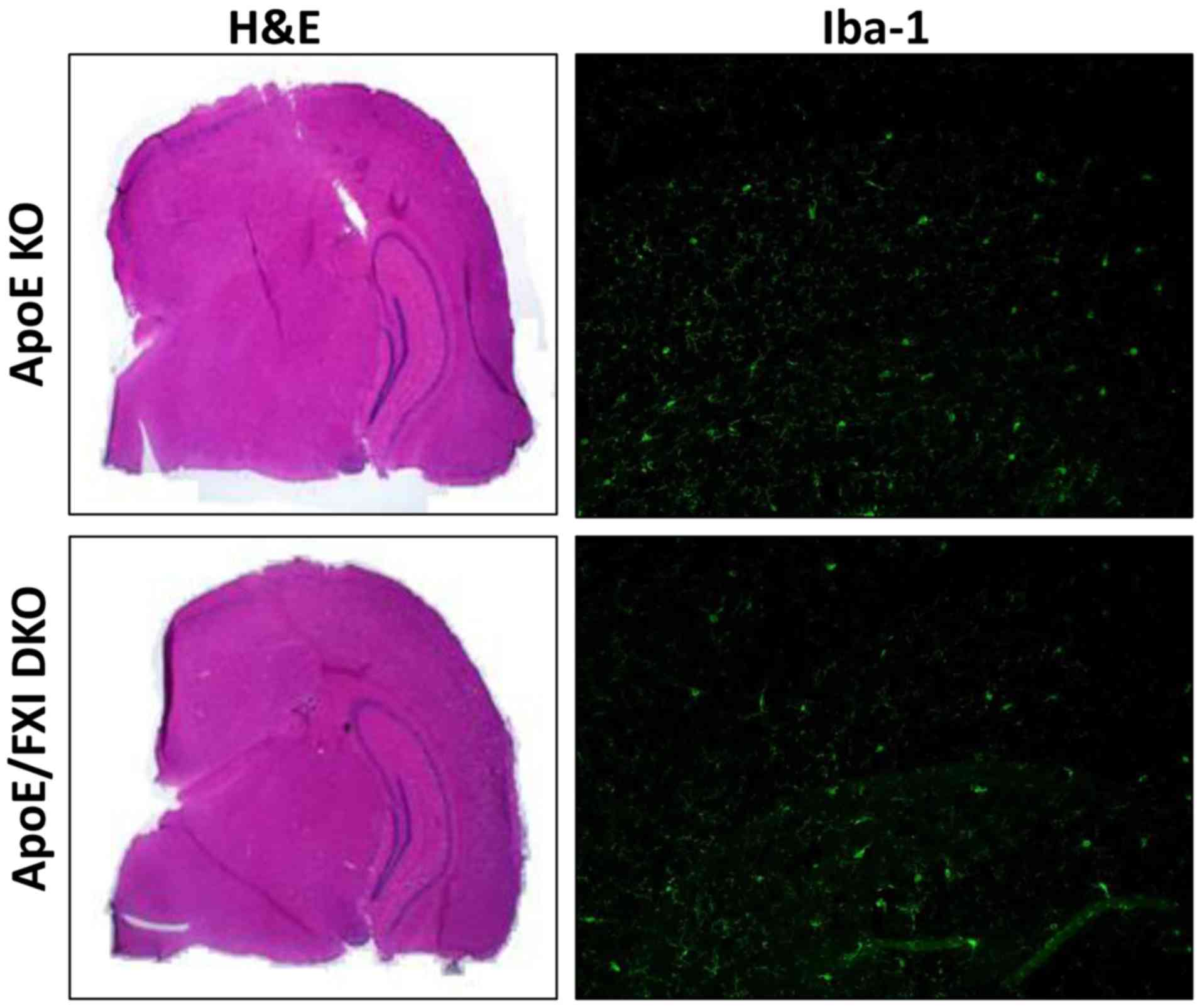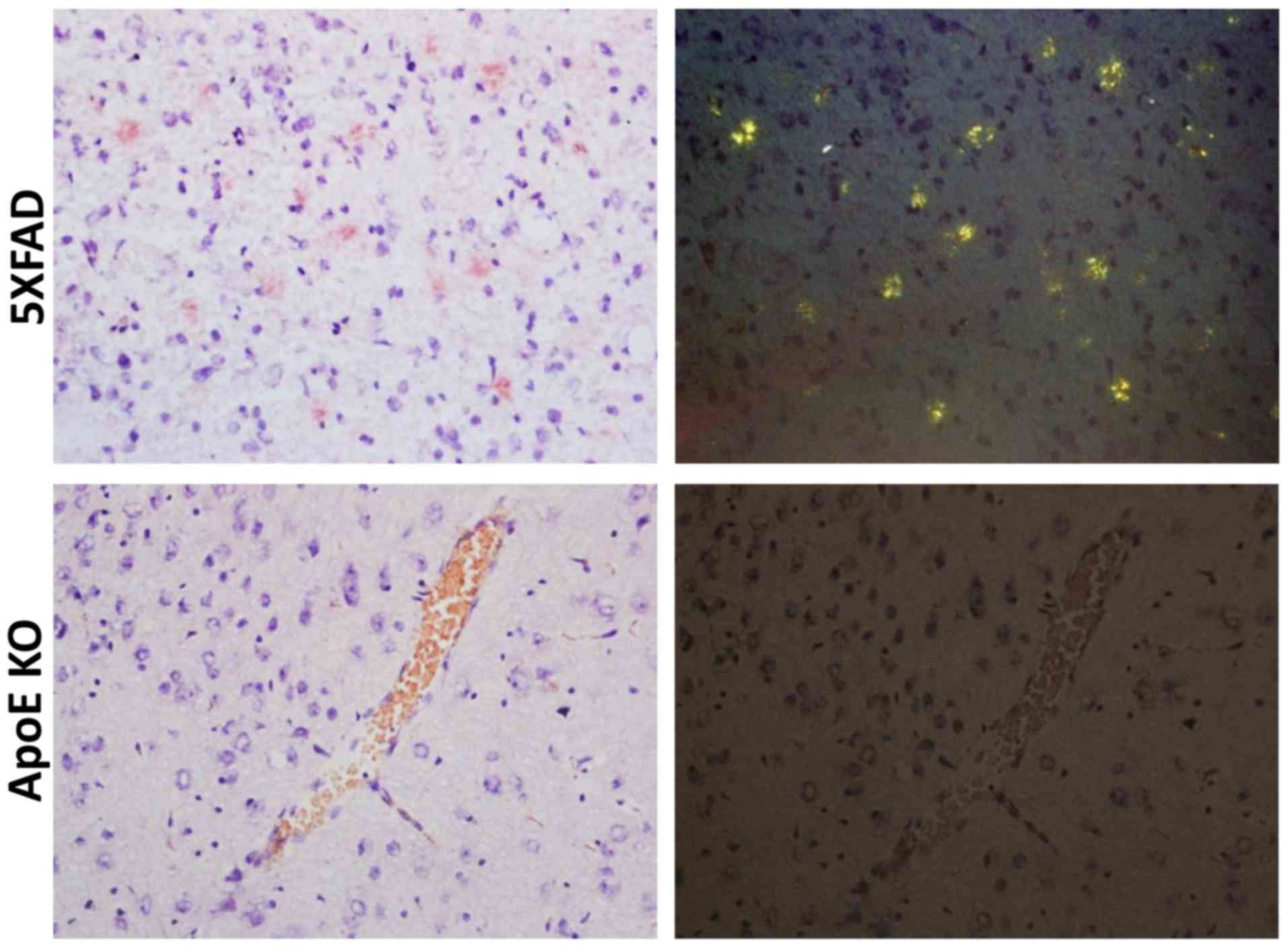|
1
|
Hansson GK: Inflammation, atherosclerosis,
and coronary artery disease. N Engl J Med. 352:1685–1695. 2005.
View Article : Google Scholar : PubMed/NCBI
|
|
2
|
Roher AE, Tyas SL, Maarouf CL, Daugs ID,
Kokjohn TA, Emmerling MR, Garami Z, Belohlavek M, Sabbagh MN, Sue
LI and Beach TG: Intracranial atherosclerosis as a contributing
factor to Alzheimer's disease dementia. Alzheimers Dement.
7:436–444. 2011. View Article : Google Scholar : PubMed/NCBI
|
|
3
|
Casserly I and Topol E: Convergence of
atherosclerosis and Alzheimer's disease: Inflammation, cholesterol,
and misfolded proteins. Lancet. 363:1139–1146. 2004. View Article : Google Scholar : PubMed/NCBI
|
|
4
|
Honig LS, Kukull W and Mayeux R:
Atherosclerosis and AD: Analysis of data from the US national
Alzheimer's coordinating center. Neurology. 64:494–500. 2005.
View Article : Google Scholar : PubMed/NCBI
|
|
5
|
Luoto TM, Haikonen S, Haapasalo H,
Goebeler S, Huhtala H, Erkinjuntti T and Karhunen PJ: Large vessel
cerebral atherosclerosis is not in direct association with
neuropathological lesions of Alzheimer's disease. Eur Neurol.
62:93–98. 2009. View Article : Google Scholar : PubMed/NCBI
|
|
6
|
Van Exel E, Gussekloo J, Houx P, de Craen
AJ, Macfarlane PW, Bootsma-van der Wiel A, Blauw GJ and Westendorp
RG: Atherosclerosis and cognitive impairment are linked in the
elderly. The Leiden 85-plus Study. Atherosclerosis. 165:353–359.
2002. View Article : Google Scholar : PubMed/NCBI
|
|
7
|
Dolan D, Troncoso J, Resnick SM, Crain BJ,
Zonderman AB and O'Brien RJ: Age, Alzheimer's disease and dementia
in the baltimore longitudinal study of ageing. Brain.
133:2225–2231. 2010. View Article : Google Scholar : PubMed/NCBI
|
|
8
|
Beach TG, Wilson JR, Sue LI, Newell A,
Poston M, Cisneros R, Pandya Y, Esh C, Connor DJ, Sabbagh M, et al:
Circle of Willis atherosclerosis: Association with Alzheimer's
disease, neuritic plaques and neurofibrillary tangles. Acta
Neuropathol. 113:13–21. 2007. View Article : Google Scholar : PubMed/NCBI
|
|
9
|
Yarchoan M, Xie SX, Kling MA, Toledo JB,
Wolk DA, Lee EB, Van Deerlin V, Lee VM, Trojanowski JQ and Arnold
SE: Cerebrovascular atherosclerosis correlates with Alzheimer
pathology in neurodegenerative dementias. Brain. 135:3749–3756.
2012. View Article : Google Scholar : PubMed/NCBI
|
|
10
|
Yuan J, Wen G, Li Y and Liu C: The
occurrence of cerebrovascular atherosclerosis in Alzheimer's
disease patients. Clin Interv Aging. 8:581–584. 2013.PubMed/NCBI
|
|
11
|
Li L, Cao D, Garber DW, Kim H and Fukuchi
K: Association of aortic atherosclerosis with cerebral
beta-amyloidosis and learning deficits in a mouse model of
Alzheimer's disease. Am J Pathol. 163:2155–2164. 2003. View Article : Google Scholar : PubMed/NCBI
|
|
12
|
Franciosi S, Gama Sosa MA, English DF,
Oler E, Oung T, Janssen WG, De Gasperi R, Schmeidler J, Dickstein
DL, Schmitz C, et al: Novel cerebrovascular pathology in mice fed a
high cholesterol diet. Mol Neurodegener. 4:422009. View Article : Google Scholar : PubMed/NCBI
|
|
13
|
Frears ER, Stephens DJ, Walters CE, Davies
H and Austen BM: The role of cholesterol in the biosynthesis of
beta-amyloid. Neuroreport. 10:1699–1705. 1999. View Article : Google Scholar : PubMed/NCBI
|
|
14
|
Simons M, Keller P, De Strooper B,
Beyreuther K, Dotti CG and Simons K: Cholesterol depletion inhibits
the generation of beta-amyloid in hippocampal neurons. Proc Natl
Acad Sci USA. 95:pp. 6460–6464. 1998; View Article : Google Scholar : PubMed/NCBI
|
|
15
|
De Meyer GR, De Cleen DM, Cooper S,
Knaapen MW, Jans DM, Martinet W, Herman AG, Bult H and Kockx MM:
Platelet phagocytosis and processing of beta-amyloid precursor
protein as a mechanism of macrophage activation in atherosclerosis.
Circ Res. 90:1197–1204. 2002. View Article : Google Scholar : PubMed/NCBI
|
|
16
|
Tibolla G, Norata GD, Meda C, Arnaboldi L,
Uboldi P, Piazza F, Ferrarese C, Corsini A, Maggi A, Vegeto E and
Catapano AL: Increased atherosclerosis and vascular inflammation in
APP transgenic mice with apolipoprotein E deficiency.
Atherosclerosis. 210:78–87. 2010. View Article : Google Scholar : PubMed/NCBI
|
|
17
|
Bales KR, Verina T, Dodel RC, Du Y,
Altstiel L, Bender M, Hyslop P, Johnstone EM, Little SP, Cummins
DJ, et al: Lack of apolipoprotein E dramatically reduces amyloid
beta-peptide deposition. Nat Genet. 17:263–264. 1997. View Article : Google Scholar : PubMed/NCBI
|
|
18
|
Choi J, Forster MJ, McDonald SR, Weintraub
ST, Carroll CA and Gracy RW: Proteomic identification of specific
oxidized proteins in ApoE-knockout mice: Relevance to Alzheimer's
disease. Free Radic Biol Med. 36:1155–1162. 2004. View Article : Google Scholar : PubMed/NCBI
|
|
19
|
Genis I, Gordon I, Sehayek E and
Michaelson DM: Phosphorylation of tau in apolipoprotein E-deficient
mice. Neurosci Lett. 199:5–8. 1995. View Article : Google Scholar : PubMed/NCBI
|
|
20
|
Gordon I, Grauer E, Genis I, Sehayek E and
Michaelson DM: Memory deficits and cholinergic impairments in
apolipoprotein E-deficient mice. Neurosci Lett. 199:1–4. 1995.
View Article : Google Scholar : PubMed/NCBI
|
|
21
|
Tai LM, Youmans KL, Jungbauer L, Yu C and
Ladu MJ: Introducing human APOE into Aβ transgenic mouse models.
Int J Alzheimer's Dis. 2011:8109812011.PubMed/NCBI
|
|
22
|
Lane-Donovan C, Wong WM, Durakoglugil MS,
Wasser CR, Jiang S, Xian X and Herz J: Genetic restoration of
plasma ApoE improves cognition and partially restores synaptic
defects in ApoE-deficient mice. J Neurosci. 36:10141–10150. 2016.
View Article : Google Scholar : PubMed/NCBI
|
|
23
|
Masliah E, Mallory M, Ge N, Alford M,
Veinbergs I and Roses AD: Neurodegeneration in the central nervous
system of apoE-deficient mice. Exp Neurol. 136:107–122. 1995.
View Article : Google Scholar : PubMed/NCBI
|
|
24
|
Methia N, André P, Hafezi-Moghadam A,
Economopoulos M, Thomas KL and Wagner DD: ApoE deficiency
compromises the blood brain barrier especially after injury. Mol
Med. 7:810–815. 2001.PubMed/NCBI
|
|
25
|
Moghadasian MH, McManus BM, Nguyen LB,
Shefer S, Nadji M, Godin DV, Green TJ, Hill J, Yang Y, Scudamore CH
and Frohlich JJ: Pathophysiology of apolipoprotein E deficiency in
mice: Relevance to apo E-related disorders in humans. FASEB J.
15:2623–2630. 2001. View Article : Google Scholar : PubMed/NCBI
|
|
26
|
Park SH, Kim JH, Choi KH, Jang YJ, Bae SS,
Choi BT and Shin HK: Hypercholesterolemia accelerates amyloid
β-induced cognitive deficits. Int J Mol Med. 31:577–582. 2013.
View Article : Google Scholar : PubMed/NCBI
|
|
27
|
Borissoff JI, Spronk HM and ten Cate H:
The hemostatic system as amodulator of atherosclerosis. N Engl J
Med. 364:1746–1760. 2011. View Article : Google Scholar : PubMed/NCBI
|
|
28
|
Shnerb Ganor R, Harats D, Schiby G,
Gailani D, Levkovitz H, Avivi C, Tamarin I, Shaish A and Salomon O:
Factor XI deficiency protects against atherogenesis in
apolipoprotein E/Factor XI double knockout mice. Arterioscler
Thromb Vasc Biol. 36:475–481. 2016. View Article : Google Scholar : PubMed/NCBI
|
|
29
|
Arai T, Miklossy J, Klegeris A, Guo JP and
McGeer PL: Thrombin and prothrombin are expressed by neurons and
glial cells and accumulate in neurofibrillary tangles in Alzheimer
disease brain. J Neuropathol Exp Neurol. 65:19–25. 2006. View Article : Google Scholar : PubMed/NCBI
|
|
30
|
Zamolodchikov D, Renné T and Strickland S:
The Alzheimer's disease peptide β-amyloid promotes thrombin
generation through activation of coagulation factor XII. J Thromb
Haemost. 14:995–1007. 2016. View Article : Google Scholar : PubMed/NCBI
|
|
31
|
Mackman N: The clot thickens in
atherosclerosis. Arterioscler Thromb Vasc Biol. 36:425–426. 2016.
View Article : Google Scholar : PubMed/NCBI
|
|
32
|
Yang DT, Flanders MM, Kim H and Rodgers
GM: Elevated factor XI activity levels are associated with an
increased odds ratio for cerebrovascular events. Am J Clin Pathol.
126:411–415. 2006. View Article : Google Scholar : PubMed/NCBI
|
|
33
|
Salomon O, Steinberg DM, Koren-Morag N,
Tanne D and Seligsohn U: Reduced incidence of ischemic stroke in
patients with severe Factor XI deficiency. Blood. 111:4113–4117.
2008. View Article : Google Scholar : PubMed/NCBI
|
|
34
|
Grammas P, Samany PG and Thirumangalakudi
L: Thrombin and inflammatory proteins are elevated in Alzheimer's
disease microvessels: Implications for disease pathogenesis. J
Alzheimers Dis. 9:51–58. 2006. View Article : Google Scholar : PubMed/NCBI
|
|
35
|
Tripathy D, Sanchez A, Yin X, Luo J,
Martinez J and Grammas P: Thrombin, a mediator of cerebrovascular
inflammation in AD and hypoxia. Front Aging Neurosci. 5:192013.
View Article : Google Scholar : PubMed/NCBI
|
|
36
|
Cortes-Canteli M, Zamolodchikov D, Ahn HJ,
Strickland S and Norris EH: Fibrinogen and altered hemostasis in
Alzheimer's disease. J Alzheimers Dis. 32:599–608. 2012.PubMed/NCBI
|
|
37
|
Loeffen R, Spronk HM and ten Cate H: The
impact of blood coagulability on atherosclerosis and cardiovascular
disease. J Thromb Haemost. 10:1207–1216. 2012. View Article : Google Scholar : PubMed/NCBI
|
|
38
|
van Montfoort ML, Kuijpers MJ, Knaup VL,
Bhanot S, Monia BP, Roelofs JJ, Heemskerk JW and Meijers JC: Factor
XI regulates pathological thrombus formation on acutely ruptured
atherosclerotic plaques. Arterioscler Thromb Vasc Biol.
34:1668–1673. 2014. View Article : Google Scholar : PubMed/NCBI
|
|
39
|
Nakashima Y, Plump AS, Raines EW, Breslow
JL and Ross R: ApoE-deficient mice develop lesions of all phases of
atherosclerosis throughout the arterial tree. Arterioscler Thromb.
14:133–140. 1994. View Article : Google Scholar : PubMed/NCBI
|
|
40
|
Gailani D and Gruber A: Factor XI as a
therapeutic target. Arterioscler Thromb Vasc Biol. 36:1316–1322.
2016. View Article : Google Scholar : PubMed/NCBI
|
|
41
|
Büller HR, Bethune C, Bhanot S, Gailani D,
Monia BP, Raskob GE, Segers A, Verhamme P and Weitz JI; FXI-ASO TKA
Investigators, : Factor XI antisense oligonucleotide for prevention
of venous thrombosis. N Engl J Med. 372:232–240. 2015. View Article : Google Scholar : PubMed/NCBI
|
|
42
|
Duga S and Salomon O: Congenital factor XI
deficiency: An update. Semin Thromb Hemost. 39:621–631. 2013.
View Article : Google Scholar : PubMed/NCBI
|
|
43
|
Kossmann S, Lagrange J, Jäckel S, Jurk K,
Ehlken M, Schönfelder T, Weihert Y, Knorr M, Brandt M, Xia N, et
al: Platelet-localized FXI promotes a vascular
coagulation-inflammatory circuit in arterial hypertension. Sci
Transl Med. 9:pii:eaah49232017. View Article : Google Scholar
|

















